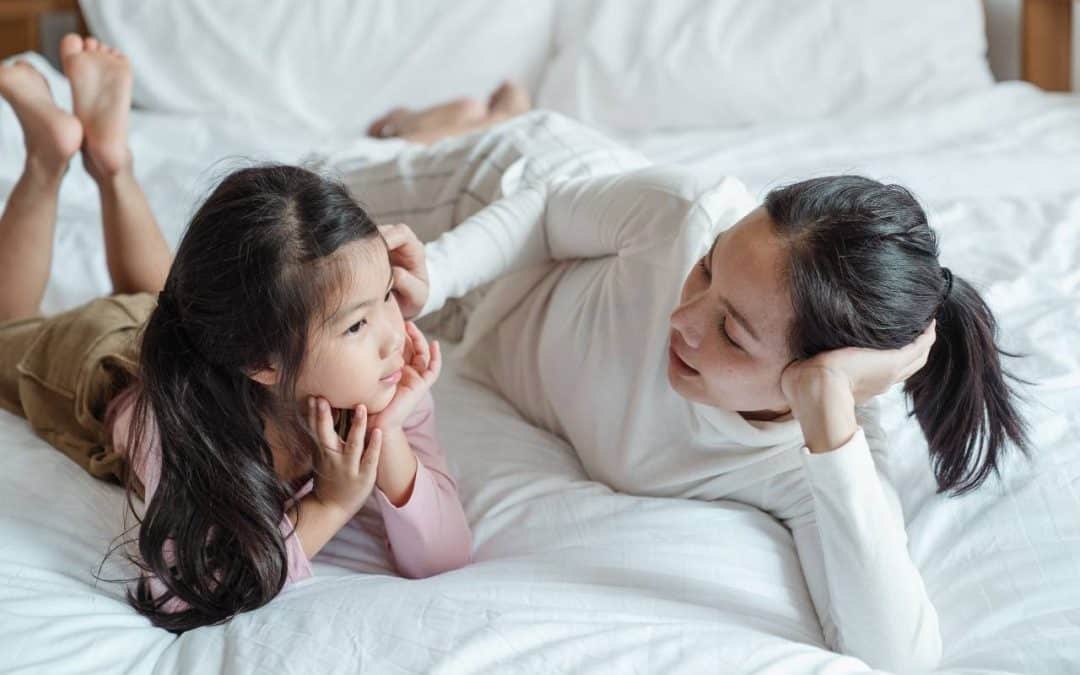Most Australian kids know how to look after their physical health. Brush your teeth, drink water, exercise. Do these things and, chances are, you will protect and strengthen your body. But when it comes to mental health and kids, it’s a bit different. Most Australian kids aren’t so sure how to look after their mental health, but that doesn’t mean they can’t learn!
Where do you start? With a conversation about mental health. It can be brilliant, terrible, somewhere in between AND throughout life we all go through ups and downs.
I’m Alice Peel, a teacher, a co-founder of Grow Your Mind which is a social and emotional wellbeing program, a writer, a mother of three kids under 12 years of age and a lover of dogs. I have learnt from delivering thousands of workshops to teachers, parents and primary aged kids, that there are 4 key ways to have meaningful conversations with kids. And the best part is that as parents and carers we all have what it takes to foster these skills in our kids.
The Questions We Ask Matter
Shift from asking your kids ‘how was your day?’, where you are sure to get a one-word answer, and instead ask a mix of ridiculous and meaningful open-ended questions:
- Who were you kind to today?
- If it could rain food for a day. What food would you choose?
- Would you rather eat snails for lunch for one day or broccoli for breakfast for a year?
- If you get sad or lonely, who could you talk to about it?
And if you spot the signs they might be struggling, don’t forget the power of simply taking a breath, pausing, and asking your child, ‘are you OK?’. You don’t have to be a mental health expert to do this. Checking in with people around you and the kids in your world, is a way of showing them you genuinely care and that you are someone they can talk to and trust. And it’s OK if your kid says, ‘no’. Listening and giving them your time might be just what they need to help them through a difficult period.
If they need further support, you can help them access professional help and reassure them you’re there with them every step of the way. The important thing is to normalise how they are feeling and keep communication channels open.
Talk To Your Kids About Their Emotions and How They Work
When kids know different words to name how they’re feeling, it opens communication, normalises the big and uncomfortable emotions and gives you as a family a toolkit for helping each other through the tricky times. A big part of having meaningful conversations is strengthening the emotional literacy of your kids. When kids can name their emotions, and understand where they come from, they are more likely to be able to tame the big ones.
Not sure where to start? We have a short: Meet the Grow Your Mind Animals animation that introduces the key emotions and brain parts through a playful animal analogy as well as a Grow Your Mind children’s podcast that shares information on the brain and covers topics such as dealing with disappointment and friendships in an age-appropriate way.
We have 4-year-olds in preschools talking about their ‘guard dog’ barking loudly (their amygdala) and making the link that calming it down helps them make better choices. Share with kids that our brain loves things such as sleep, kindness, water, and exercise.
Talk to your kids about your own healthy habits
Wellbeing is not a spectator sport. Perhaps you grab some exercise or get out in nature. Let your kids know there are things you do to look after your own wellbeing e.g., before I sit with my animals, I will often announce that, ‘I need to get some good mental health for a bit so will be patting the dogs’.
We are wired for connection and belonging. Let your kids know about the people you love, value, and communicate with. Let them know when you’ve had an R U OK? conversation with someone and the difference it made to their day. Teach them that conversations matter and can help someone if they’re struggling.
The important thing here is, we cannot expect our own kids to nurture and protect their mental health if we aren’t making it a priority for ourselves.
Normalise the ups and downs and make space for gratitude
Stuff ups, setbacks, sadness, hurt and failure are a part of life. Let your kids share their hurts and name their big uncomfortable feelings. And as part of your day, build in a practice of looking for the good. Invite your kids to hold up their hand and on each finger name one person or thing they feel thankful for. Try out a family gratitude journal or jar. It doesn’t have to be every day and it should never be forced otherwise it will have the reverse effect. Remember gratitude is not about denying uncomfortable emotions – this will only erode your capacity for good mental health. Rather, gratitude is acknowledging the struggles while making space for the good things in life.
A final word. Keep it playful. Poor mental health is serious, mental health education shouldn’t be. Get outside together, get moving, have a laugh and play together. And remember to ask, ‘are you OK?’.
There are 4 key ways to have meaningful conversations with kids. Visit MUM CFOs blogs to find out more.
You can use the four R U OK? conversation steps; Ask, Listen, Encourage Action and Check Listen as a guide. For free tips and tools visit: https://www.ruok.org.au/how-to-ask




